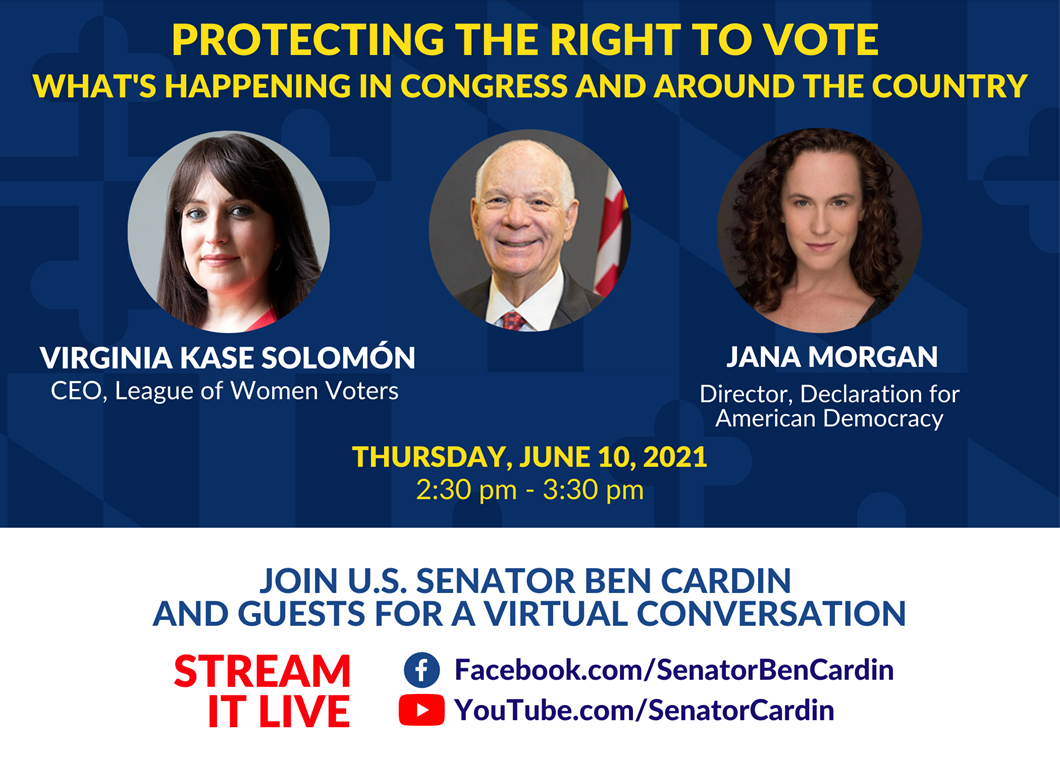June 5, 2021
Dear Fellow Marylander:
In America, we expect our elections to be fair and follow the law. How we elect our leaders is prominent throughout the Constitution. The rules for who can run for office are public information and, unlike in authoritarian governments, there are real options and differences between parties and candidates. Through generations of violent struggles, on the streets and in the courtrooms, we eliminated racist poll taxes and secured the right to vote for all citizens regardless of race or sex.
Last year, as our nation grappled with the difficulties of running fair and legal elections at the height of a deadly pandemic, states rightly made accommodations within the law for public health purposes to make it safer to vote. Drop boxes became commonplace, voting hours were expanded, mail-in options more flexible.
Perhaps not surprisingly, the result was more Americans voting than ever before — and with no discernible fraud or anything that would have changed the results of the election, according to five dozen court cases.
Higher voter participation was a win for our country and democracy in the midst of the darkness of the pandemic. The more people who participate in our system of government through voting, the more we fulfill Abraham Lincoln’s vision of “government of the people, by the people and for the people.”
Every election has winners and losers. Losing an election does not mean the election was unfair or fraudulent, it means the voters who voted in that election preferred someone else for whatever policy or personality-based reason.
However, in the aftermath of the 2020 election, we have witnessed an unprecedented assault on our very system of democracy. Leaders within the Republican Party – after losing the presidency and control of the U.S. Senate – decided that the way to win future elections is to change the rules so that people who voted for anyone else will have a harder time voting.
It’s like changing the rules in football so that half the other team can’t even make it to the stadium in time for the game.
This is exactly what is happening in states like Texas and Georgia. Unfortunately, they are not outliers. According to the nonpartisan Brennan Center for Justice, there have been 389 bills with voting restrictions across 48 states, as of mid-May of this year. Arizona, alone, has 22 voter restriction provisions under consideration. So far, 14 states have passed laws that make it more difficult for voters to vote. Among the many new changes are shortening of early-vote periods, purging voters from registration rolls if they miss an election, restricting absentee voting eligibility, and eliminating or setting limits on the use of drop boxes. Florida even made it illegal to provide food and water to someone waiting in line to vote.
It astounds me that elected officials are blatantly trying to make it harder for eligible voters to cast their ballots. Rigging the electoral process may happen in Russia or Nicaragua, but it is not the way American democracy, or a republic for that matter, is supposed to work.
Thankfully, in Maryland, our legislature has moved in the other direction. Lawmakers in Annapolis recently approved and the governor signed into law new provisions making it easier for Marylanders to vote. In future elections, voters can opt to have mail-in ballots automatically sent, saving hassle and time. New laws also increase the number of early voting sites based on the number of registered voters in a county.
Nationally, Congress is considering legislation that would protect the right to vote for voters in all states. The For the People Act has already passed the House of Representatives and should be considered by the full Senate in coming weeks. This legislative package, which I have cosponsored and contains legislation that I have authored, would restore fairness to our elections by making it easier for all voters to vote. No matter if you live in Maryland or Montana, the For the People Act would guarantee at least two weeks of early voting in all states, make voter registration automatic when an eligible person gets a drivers license, prohibit voter intimidation, limit dark money in politics, move us away from gerrymandered or partisan congressional districts, and more.
We cannot let this effort be stalled or blocked by partisan gridlock. The Constitution gives Congress the power to determine the time, place and manner of federal elections. Conservative Supreme Court Justice Antonin Scalia found in a 2013 decision that Congress has broad powers to “provide a complete code for congressional elections.” Congress must exercise these powers and take action to protect the right to vote for all, or be complicit in returning to a time when huge blocks of American citizens were purposefully disenfranchised by their own government.
I refuse to be complicit in taking away the voting rights of American citizens.
Voting is a fundamental part of our democracy and it is under attack on many fronts. I will continue to speak out against voting restrictions that would diminish the fairness and integrity of American elections by limiting the participation of eligible voters. More voters voting is a good thing for America. I urge you to speak out, as well.
Thank you. Please stay safe.

Ben
To learn more about how the For the People Act can help preserve voting rights in America, tune in Thursday, June 10 at 2:30pm for my latest Facebook Live. Joining me for this conversation will be Virginia Kase Solomón, CEO of the League of Women Voters and Jana Morgan, Director of the Declaration for American Democracy.


